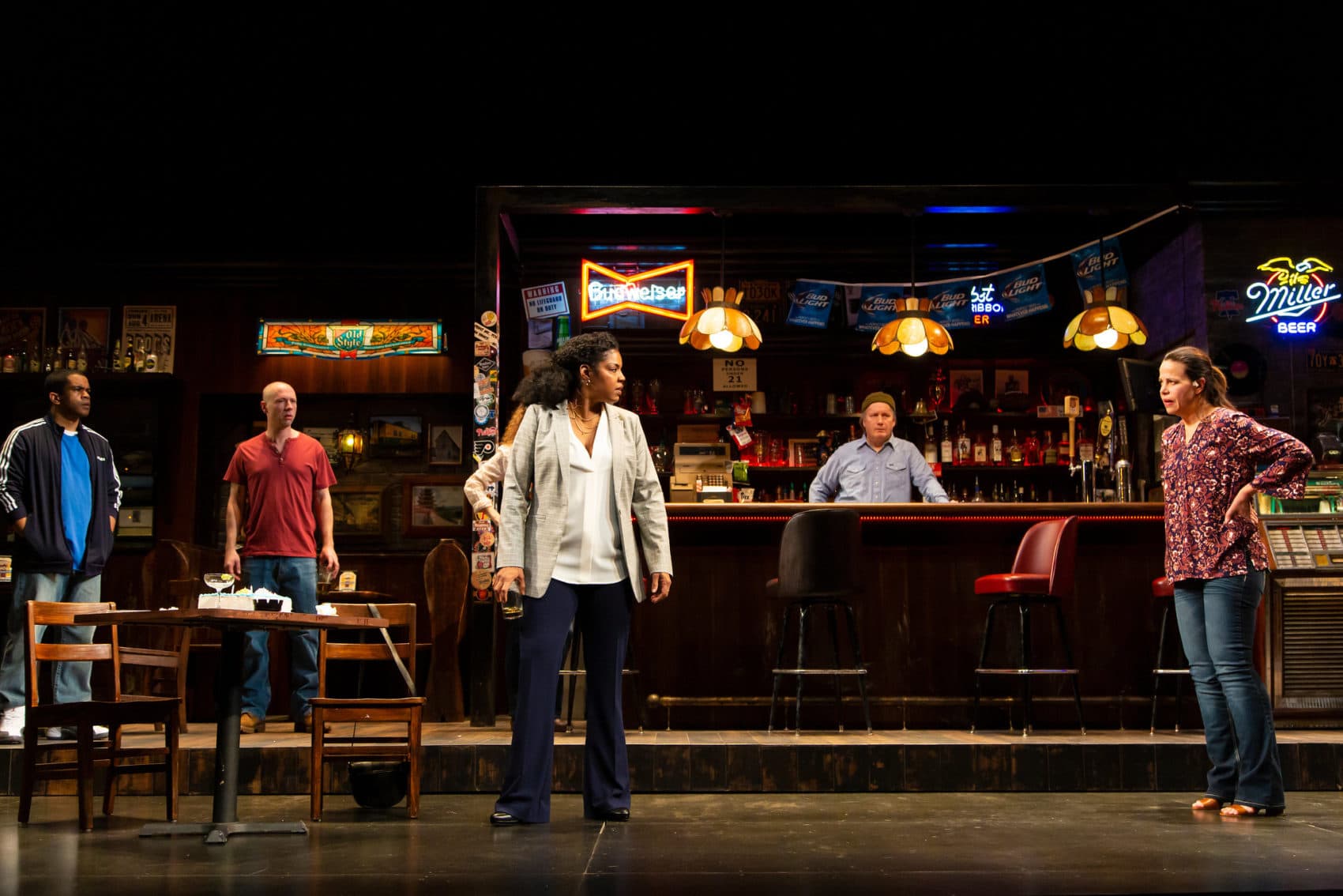Advertisement
Review
At The Huntington, Pulitzer-Winning 'Sweat' Tugs At Roots Of Rage That Empowered Trump

There is a bar code in “Sweat,” by which the habitués of the working class tavern where most of the play takes place live: support the union, support one another, begrudgingly support the company that has been their livelihoods since the last eraser was clapped and the ink was dry on their high school diplomas. Lynn Nottage’s 2017 Pulitzer Prize-winning play, in a blistering Boston premiere by the Huntington Theatre Company, explores what happens when those givens start to peel like the barroom paneling and jangle like the jukebox.
It would be hard to conjure a theater piece, however traditional in form, that’s timelier than “Sweat.” Though it’s set during the banner years of George W. Bush’s and Barack Obama’s elections, it catches the simmer, and then the boil, of the American melting pot that later exploded into the election of Donald Trump, anger surrogate for the nation.
Of course, dramatist Nottage (who won her first Pulitzer for “Ruined”) could not have predicted that. But given her embedding among the displaced steel workers of Reading, Pennsylvania, where she conducted the interviews that formed the basis for the play, she could not have been surprised. Still, “Sweat” is more than just some socioeconomic snapshot of a country headed toward hatred. (Indeed, some of the language, especially when it comes to broken dreams, is quite lyrical.) Gritty, emotive and explosive, the play demonstrates how tragedies more personal than the election of the current president have fulminated from the divisiveness that rocks America in the 21st century.
The play opens in in a stark little office in September 2008 as a disembodied headline blares the news of the “largest single-day decline in stock market history.” One young man and then another – one white, tattooed and sullen; the other black, nervous and sincere; both recently released from prison – are being interviewed by their parole officer. The drama then flashes back to a Reading watering hole in 2000, when the town was well on its way, though its workers didn’t quite perceive it yet, to becoming a factory town without a factory.

Contradictorily, we are at a celebration (well, maybe a little too much celebration) as three longtime female friends ring in one of their birthdays with booze, cake and some unsteady dancing. Two are on their feet; the third is slumped in a chair in a prom dress, her face planted in the table. This thick-as-thieves trio comprises brittle Tracey and liquefied Jessie, who are white, and freewheeling Cynthia, who is black – three ladies who have had one another’s backs on the factory floor for 25 years. As lewd talk mixes it up with shop talk, NAFTA-bashing white bartender Stan (a former factory worker sidelined by a workplace injury) gets into the discussion while hustling Latino underling Oscar, who harbors ambitions that may look beyond the union label, mops the floor.
Workplace rumor has it that one of the plant’s managers has been promoted and that his replacement may be hired “from the floor.” “More money. More heat. More vacation. Less work. That’s all I need to know,” sums up Cynthia, who plans to apply. Pretty soon Tracey, too, warms to the idea. When Cynthia gets the job just as the suits are threatening to lock out the union unless crippling concessions in both pay and benefits are made, things splinter not just between management and labor but along racial and xenophobic lines. Sadly, the rift among the women and the one between Cynthia and her strung-out ex-husband, whose union has been locked out of its workplace for two years, does not extend to Tracey’s and Cynthia’s sons, Jason and Chris, who, when they almost accidentally resort to an unthinkable thing, go down as one.
Advertisement

Kimberly Senior is at the helm of the Huntington production, whose dexterous leaps among locales are abetted by Cameron Anderson’s set, which has all the pocked bricks-and-mortar patina of an urban environment on the downslide but moves like a weighty machine. And in D.M. Wood’s lighting design, the dark, neon-festooned barroom exudes the same musty air of permanence the drinkers thought their working lives had. In Senior’s hands, the interaction starts physical, then moves from booze-fueled camaraderie to booze-fueled rage. (The fight choreography by Ted Hewlett is so convincing that spectators may want to duck.) And the performances give off a feral sadness that’s as distressing as all the aggression.
The cast, a mix of local and imported (mostly from Chicago) actors, is uniformly credible, conveying in jumpy body language the stresses that don’t find their way into the dialogue. This is particularly true of Brandon G. Green’s torn, earnest Chris and Alvin Keith’s Brucie, the broken, agitated soul trying to charm his way back into Cynthia’s affections – or at least into her pocketbook.
As Cynthia, Tyla Abercrumbie (Showtime’s “The Chi”) is a cocky, soft-edged powerhouse who poignantly conveys the conundrum in which her promotion has landed her. Jennifer Regan, as Tracey, is deliberately without the soft edges, but her prickly distress is equally affecting. Not surprisingly, the excellent Marianna Bassham finds both the silent-film-worthy physical comedy in the oft-comatose Jessie and the deep regret etched into her mantra of a world tour never taken: “Istanbul, Tehran, Kandahar, Kabul, Peshawar, Lahore, Kathmandu.”
Maurice Emmanuel Parent gives a typically crisp performance as Evan, the parole officer, and Shane Kenyon is scarily hollow yet also vulnerable as Jason, whose dead end turns out to be white supremacy. Tommy Rivera-Vega is a deferential yet hustling Oscar; Guy Van Swearingen as Stan, with his ponytail and American flag t-shirt, a thoughtful cross between hipster den father and working-class prophet. All of the performances, in fact, crackle yet seem unmarred by effort. In other words: no sweat.
The Huntington Theatre Company production "Sweat" runs at the Huntington Avenue Theatre through March 1.
